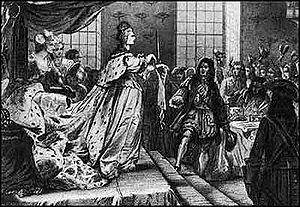22:
237:, the main author of the Conditions, did not directly report that the power of the Supreme Secret Council was temporary and so most of the high-ranking officials, as well as many young lower officers, thought that Golitsyn and the Supreme Secret Council wanted to usurp power. All of those misinterpretations were worsened by absolutist propaganda from
205:). The majority of the nobility had to guess about its content when the conditions have been presented at the meeting of the officials held on February 2 (13), 1730. Only then was there I the Russian nobility an obvious split - which led, in particular, to the appearance of programs of noble opposition.
221:
There were seven major drafts, and none of them preserved absolutism. Some proposed to limit the monarch's power by the parliament or by the state council, according to the
English or Swedish model to which Golitsyn's project belonged, others to make the emperor elective as in Poland and still others
127:
226:
Projectand would establish the Higher
Government of 21 people and introduce the election of members of this government, senators, governors and presidents of colleges by the second chamber of 100 people. Since the Supreme Secret Council would be abolished by the project, most
166:. When the Empress returned to Russia, she revoked her approval of the Conditions and dissolved the Supreme Privy Council on the 20 February. The members of the council were removed from government and exiled or repressed paving the way for Anna to become an
213:
did not propose their own draft of the future state structure but suggested to the nobility to develop it by themselves when the nobility were gathered in Moscow to draw up the next
Ulozhenanaya Commission and to the failed wedding ceremony of the
208:
The
Conditions, according to contemporaries, were only a preliminary document, as a squeeze of the more extensive radical plan developed by the Prince Golitsyn was not approved by the Secret Council. Not having come to an internal agreement, the
271:
None of those powers could be exercised by the monarch under the
Conditions without the approval of the Supreme Privy Council, or else the monarch would face the possibility of deposition.
244:
The nobility began to oppose the
Conditions. When Anna Ivanovna came in Moscow, noble delegations came to her demanding her to abolish the Conditions and return to absolutism.
264:
binding the monarch in relation to declarations of war, the signing of treaties, the imposing of new taxes, the appointing of officers to ranks higher than
253:
222:
proposed to establish an aristocratic republic. The most popular project, which was supported by 364 people, was sometimes called the
Cherkassky-
234:
293:
283:
43:
113:
187:
94:
66:
47:
73:
80:
268:(colonel), the depriving and granting of estates, appointments to the court ranks and the use of public revenues.
32:
62:
298:
288:
186:
compiled the conditions immediately after the death of Peter II and before they were sent to the capital of
51:
36:
183:
163:
238:
126:
215:
87:
223:
167:
139:
252:
171:
195:
155:
147:
277:
261:
201:
A curious feature is that the document remained unpublished by the high officials (
21:
182:
In the period
January 18 (29) to January 20 (31), 1730 the members of the
191:
159:
151:
251:
198:, who had been elected the inheritress of the Russian throne.
15:
162:
on 18 January 1730, giving substantial power to the
8:
50:. Unsourced material may be challenged and
114:Learn how and when to remove this message
125:
130:Empress Anna abrogates the Conditions
7:
48:adding citations to reliable sources
146:, Konditsii) were an 18th-century
14:
20:
1:
294:Political history of Russia
284:1730s in the Russian Empire
315:
260:The Conditions acted as a
170:in the model of her uncle
143:
63:"Conditions" Russia
257:
131:
255:
194:, to be presented to
184:Supreme Privy Council
164:Supreme Privy Council
129:
239:Theophan Prokopovich
154:, signed by Empress
44:improve this article
258:
132:
231:were against it.
124:
123:
116:
98:
306:
168:absolute monarch
145:
119:
112:
108:
105:
99:
97:
56:
24:
16:
314:
313:
309:
308:
307:
305:
304:
303:
274:
273:
256:Conditions text
250:
235:Dmitry Golitsyn
180:
172:Peter the Great
120:
109:
103:
100:
57:
55:
41:
25:
12:
11:
5:
312:
310:
302:
301:
299:Anna of Russia
296:
291:
289:1730 in Europe
286:
276:
275:
249:
246:
196:Anna of Russia
179:
176:
156:Anna of Russia
148:constitutional
122:
121:
28:
26:
19:
13:
10:
9:
6:
4:
3:
2:
311:
300:
297:
295:
292:
290:
287:
285:
282:
281:
279:
272:
269:
267:
263:
254:
247:
245:
242:
240:
236:
232:
230:
225:
219:
217:
212:
206:
204:
199:
197:
193:
189:
185:
177:
175:
173:
169:
165:
161:
157:
153:
149:
141:
137:
128:
118:
115:
107:
96:
93:
89:
86:
82:
79:
75:
72:
68:
65: –
64:
60:
59:Find sources:
53:
49:
45:
39:
38:
34:
29:This article
27:
23:
18:
17:
270:
265:
262:constitution
259:
243:
233:
228:
220:
210:
207:
202:
200:
181:
135:
133:
110:
101:
91:
84:
77:
70:
58:
42:Please help
30:
203:“verhovniki
150:project in
278:Categories
266:plolkovnik
229:verhovniki
224:Tatishchev
178:Background
136:Conditions
74:newspapers
211:verhovnik
104:July 2012
31:does not
216:Peter II
188:Courland
144:Кондиции
140:Russian
88:scholar
52:removed
37:sources
192:Mitava
152:Russia
90:
83:
76:
69:
61:
248:Terms
160:Mitau
95:JSTOR
81:books
134:The
67:news
35:any
33:cite
218:.
158:in
46:by
280::
241:.
190:,
174:.
142::
138:(
117:)
111:(
106:)
102:(
92:·
85:·
78:·
71:·
54:.
40:.
Text is available under the Creative Commons Attribution-ShareAlike License. Additional terms may apply.
